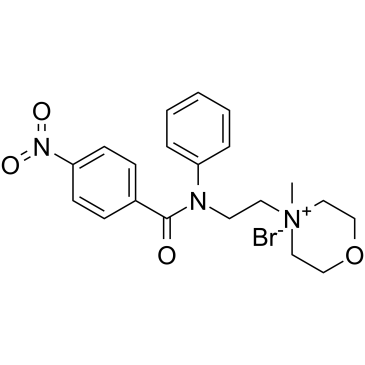Plasmodium falciparum: growth response to potassium channel blocking compounds.
Karena L Waller, Kami Kim, Thomas V McDonald
文献索引:Exp. Parasitol. 120(3) , 280-5, (2008)
全文:HTML全文
摘要
Potassium channels are essential for cell survival and regulate the cell membrane potential and electrochemical gradient. During its lifecycle, Plasmodium falciparum parasites must rapidly adapt to dramatically variant ionic conditions within the mosquito mid-gut, the hepatocyte and red blood cell (RBC) cytosols, and the human circulatory system. To probe the participation of K(+) channels in parasite viability, growth response assays were performed in which asexual stage P. falciparum parasites were cultured in the presence of various Ca(2+)-activated K(+) channel blocking compounds. These data describe the novel anti-malarial effects of bicuculline methiodide and tubocurarine chloride and the novel lack of effect of apamine and verruculogen. Taken together, the data herein imply the presence of K(+) channels, or other parasite-specific targets, in P. falciparum-infected RBCs that are sensitive to blockade with Ca(2+)-activated K(+) channel blocking compounds.
相关化合物
| 结构式 | 名称/CAS号 | 分子式 | 全部文献 |
|---|---|---|---|
 |
震颤真菌毒素
CAS:12771-72-1 |
C20H24BrN3O4 |
|
Verruculogen production in airborne and clinical isolates of...
2005-12-01 [Acta. Pharm. 55(4) , 357-64, (2005)] |
|
Actions of tremorgenic fungal toxins on neurotransmitter rel...
1980-01-01 [J. Neurochem. 34(1) , 33-42, (1980)] |
|
A comparative study of sheep and pigs given the tremorgenic ...
1982-09-01 [Res. Vet. Sci. 33(2) , 183-7, (1982)] |
|
Actions of a tremorgenic mycotoxin on amino acid transmitter...
1982-09-01 [Biochem. Pharmacol. 31(17) , 2807-10, (1982)] |
|
FtmOx1, a non-heme Fe(II) and alpha-ketoglutarate-dependent ...
2009-10-07 [Org. Biomol. Chem. 7(19) , 4082-7, (2009)] |